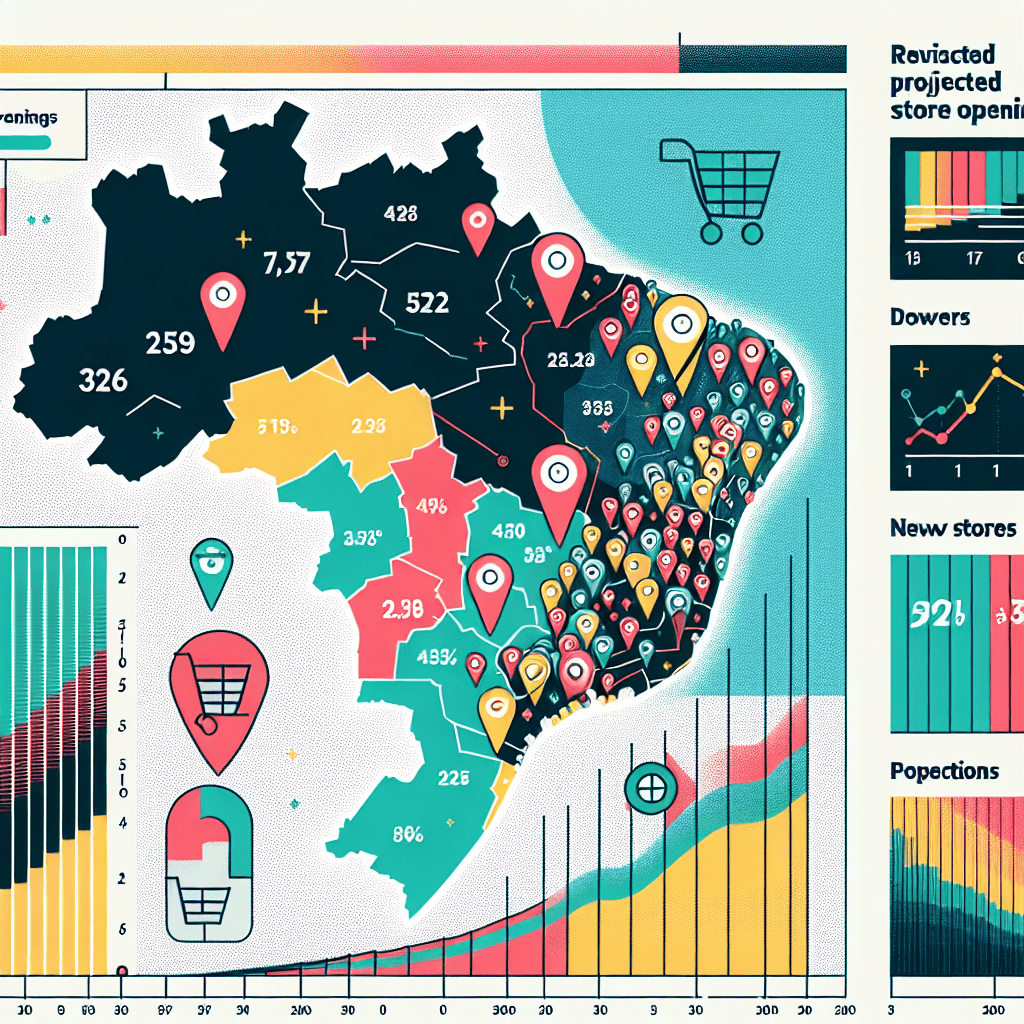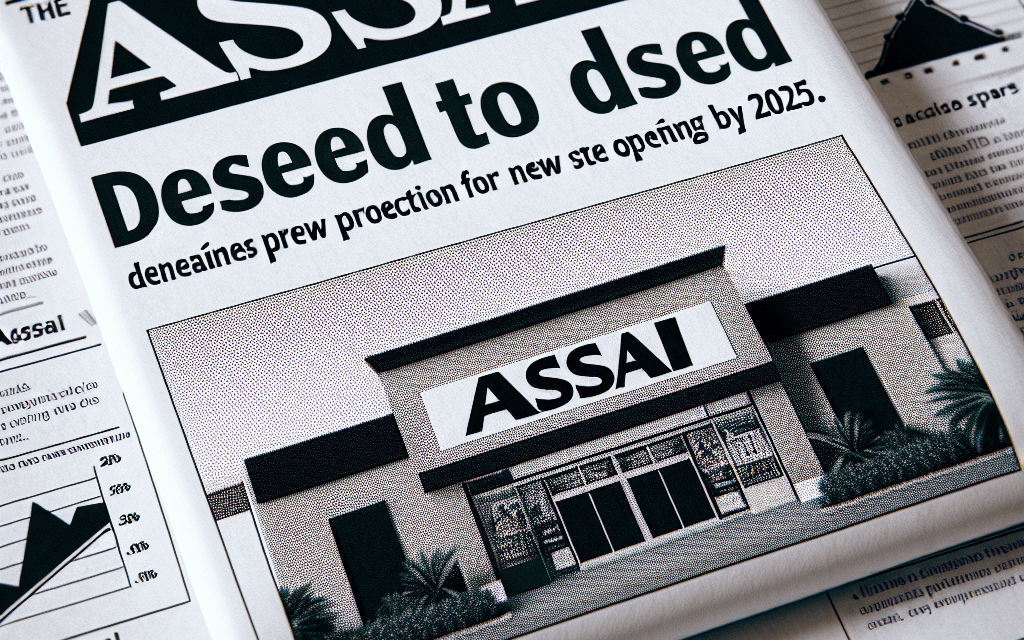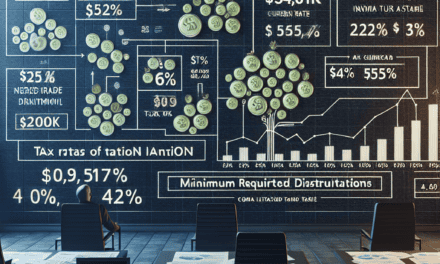“Assaí Adjusts Course: Strategic Growth with Revised 2025 Store Openings in Brazil”
Introduction
Assaí Atacadista, one of Brazil’s leading wholesale supermarket chains, has announced a strategic revision of its expansion plans, projecting a reduction in the number of new store openings by 2025. This adjustment reflects a response to evolving market conditions and a focus on optimizing operational efficiency and profitability. The company, known for its cash-and-carry model, aims to consolidate its presence in key regions while enhancing the customer experience and supply chain capabilities. By recalibrating its growth trajectory, Assaí seeks to maintain its competitive edge in Brazil’s dynamic retail landscape, ensuring sustainable development and long-term success.
Impact Of Economic Trends On Assai’s Expansion Plans
Assaí, a prominent player in Brazil’s wholesale retail sector, has recently announced a revision of its new store opening projections for 2025, a decision that reflects the broader economic trends impacting the region. This adjustment in strategy underscores the intricate relationship between macroeconomic conditions and corporate expansion plans. As Brazil navigates a complex economic landscape characterized by fluctuating growth rates, inflationary pressures, and evolving consumer behaviors, companies like Assaí are compelled to reassess their growth trajectories to align with the prevailing economic realities.
The decision to lower the new store opening projections is not made in isolation but is a response to a confluence of economic factors. Brazil’s economy, while showing signs of recovery post-pandemic, continues to grapple with challenges such as inflation and interest rate volatility. These factors have a direct impact on consumer purchasing power and, consequently, on retail sales. For Assaí, which operates in the wholesale sector, understanding these dynamics is crucial as they influence both the demand for products and the cost of operations.
Moreover, the retail landscape in Brazil is undergoing significant transformation, driven by technological advancements and changing consumer preferences. The rise of e-commerce and digital platforms has altered the way consumers shop, prompting traditional retailers to rethink their brick-and-mortar strategies. In this context, Assaí’s decision to temper its expansion plans can be seen as a strategic move to ensure that its growth is sustainable and aligned with market demands. By focusing on optimizing existing operations and enhancing customer experience, Assaí aims to strengthen its market position while preparing for future opportunities.
In addition to domestic economic conditions, global economic trends also play a role in shaping Assaí’s expansion strategy. The interconnectedness of global markets means that fluctuations in international trade, currency exchange rates, and geopolitical developments can have ripple effects on local economies. For instance, changes in trade policies or supply chain disruptions can impact the availability and cost of goods, influencing retail operations. Assaí’s cautious approach to expansion reflects an awareness of these global dynamics and a commitment to maintaining operational resilience in the face of uncertainty.
Furthermore, Assaí’s revised projections highlight the importance of strategic agility in today’s business environment. Companies must be able to adapt quickly to changing conditions, leveraging data and insights to make informed decisions. For Assaí, this means continuously monitoring economic indicators, consumer trends, and competitive dynamics to refine its growth strategy. By doing so, the company can better navigate the challenges and opportunities that lie ahead, ensuring that its expansion efforts are both prudent and profitable.
In conclusion, Assaí’s decision to lower its 2025 new store opening projections is a reflection of the complex economic trends influencing Brazil’s retail sector. By taking a measured approach to expansion, Assaí demonstrates a commitment to aligning its growth strategy with the realities of the market. This decision underscores the importance of strategic flexibility and operational resilience in navigating the ever-evolving economic landscape. As Assaí continues to adapt to these conditions, it remains well-positioned to capitalize on future growth opportunities while maintaining its competitive edge in the Brazilian wholesale market.
Analyzing Consumer Demand In Brazil’s Retail Market
In recent years, Brazil’s retail market has experienced significant shifts, driven by evolving consumer demands and economic fluctuations. One of the key players in this landscape, Assaí Atacadista, has recently announced a revision of its new store opening projections for 2025. This decision reflects broader trends within the Brazilian retail sector, where understanding and adapting to consumer demand is crucial for sustained growth and profitability.
Assaí’s decision to lower its new store opening projections is indicative of a more cautious approach in response to changing market dynamics. The Brazilian economy, while showing signs of recovery, continues to face challenges such as inflationary pressures and fluctuating consumer confidence. These factors have a direct impact on consumer spending patterns, prompting retailers to reassess their expansion strategies. By adjusting its projections, Assaí aims to align more closely with current consumer demand, ensuring that its growth is sustainable and responsive to market conditions.
Moreover, the shift in Assaí’s strategy underscores the importance of data-driven decision-making in the retail sector. Retailers are increasingly relying on sophisticated analytics to gain insights into consumer behavior, preferences, and purchasing power. This data-driven approach enables companies like Assaí to make informed decisions about where and when to open new stores, optimizing their investments and minimizing risks. By leveraging data analytics, Assaí can better understand regional variations in demand, allowing for a more targeted and efficient expansion strategy.
In addition to economic factors, changing consumer preferences are also influencing Assaí’s revised projections. Brazilian consumers are becoming more discerning, with a growing emphasis on value, quality, and convenience. This shift is partly driven by the rise of digital technologies, which have empowered consumers with more information and choices than ever before. As a result, retailers must adapt to these changing expectations by offering a more personalized and seamless shopping experience. For Assaí, this means not only focusing on physical store expansion but also enhancing its digital presence and integrating online and offline channels to meet the needs of modern consumers.
Furthermore, sustainability has emerged as a significant consideration for both consumers and retailers in Brazil. As environmental awareness grows, consumers are increasingly seeking out brands and retailers that demonstrate a commitment to sustainable practices. This trend is influencing retail strategies, with companies like Assaí investing in sustainable supply chains, energy-efficient store designs, and waste reduction initiatives. By aligning its operations with consumer values, Assaí can strengthen its brand reputation and foster customer loyalty, which are critical components of long-term success in the competitive retail market.
In conclusion, Assaí’s decision to lower its 2025 new store opening projections reflects a broader trend within Brazil’s retail market, where understanding and adapting to consumer demand is paramount. Economic challenges, evolving consumer preferences, and the growing importance of sustainability are all shaping the strategies of retailers in Brazil. By adopting a data-driven approach and aligning its operations with consumer values, Assaí is positioning itself to navigate these complexities and achieve sustainable growth. As the retail landscape continues to evolve, companies that can effectively analyze and respond to consumer demand will be best positioned to thrive in Brazil’s dynamic market.
Strategic Location Selection For New Assai Stores
Assaí Atacadista, a prominent player in the Brazilian wholesale retail market, has recently announced a revision of its new store opening projections for 2025. This decision reflects a strategic shift in the company’s approach to expansion, emphasizing the importance of careful location selection to ensure sustainable growth. As the retail landscape in Brazil continues to evolve, Assaí’s recalibrated strategy underscores the necessity of aligning expansion plans with market dynamics and consumer behavior.
The decision to lower the number of new store openings is not merely a response to market pressures but a calculated move to enhance the company’s long-term viability. By focusing on strategic location selection, Assaí aims to optimize its presence in regions with the highest potential for growth. This approach involves a comprehensive analysis of demographic trends, economic indicators, and competitive landscapes to identify areas where new stores can thrive. In doing so, Assaí seeks to maximize its return on investment while minimizing the risks associated with overexpansion.
Moreover, the revised projections reflect Assaí’s commitment to maintaining operational efficiency and profitability. By concentrating resources on fewer, strategically chosen locations, the company can allocate more attention and investment to each new store. This enables Assaí to ensure that each outlet is equipped with the necessary infrastructure, inventory, and staffing to meet local demand effectively. Consequently, this focus on quality over quantity is expected to enhance customer satisfaction and loyalty, further solidifying Assaí’s position in the competitive wholesale market.
In addition to optimizing location selection, Assaí’s strategy also involves leveraging data analytics and market research to inform its decisions. By utilizing advanced analytical tools, the company can gain deeper insights into consumer preferences and purchasing patterns. This data-driven approach allows Assaí to tailor its offerings to meet the specific needs of each community it serves, thereby increasing the likelihood of success for new stores. Furthermore, this emphasis on data analytics aligns with broader industry trends, as retailers increasingly rely on technology to drive strategic decision-making.
While the decision to lower new store opening projections may seem conservative, it is a prudent response to the current economic climate in Brazil. The country has faced various economic challenges in recent years, including inflationary pressures and fluctuating consumer confidence. By adopting a more measured approach to expansion, Assaí can better navigate these uncertainties and position itself for sustainable growth in the long term. This strategic restraint also allows the company to remain agile and responsive to changing market conditions, ensuring that it can capitalize on emerging opportunities as they arise.
In conclusion, Assaí’s decision to adjust its 2025 new store opening projections reflects a strategic emphasis on location selection and operational efficiency. By prioritizing quality over quantity and leveraging data-driven insights, the company aims to enhance its market presence while mitigating risks. This approach not only aligns with current economic realities but also positions Assaí for continued success in Brazil’s dynamic retail landscape. As the company moves forward, its focus on strategic location selection will undoubtedly play a crucial role in shaping its future growth trajectory.
Competitive Landscape: Assai Vs. Other Retailers

In the dynamic and ever-evolving landscape of Brazilian retail, Assaí Atacadista, a prominent player in the wholesale segment, has recently adjusted its strategic outlook by lowering its new store opening projections for 2025. This decision comes amidst a competitive environment where various factors, including economic conditions and market saturation, play pivotal roles. As Assaí recalibrates its growth strategy, it is essential to examine how this move positions the company relative to its competitors and what implications it holds for the broader retail sector in Brazil.
Assaí’s decision to scale back its expansion plans is not made in isolation but rather reflects a broader trend among retailers in Brazil who are navigating a complex economic landscape. The Brazilian economy, while showing signs of recovery, continues to grapple with challenges such as inflationary pressures and fluctuating consumer confidence. These economic variables necessitate a cautious approach to expansion, prompting Assaí to reassess its growth trajectory. By tempering its store opening projections, Assaí aims to consolidate its existing operations, optimize supply chain efficiencies, and enhance customer experience, thereby strengthening its competitive position.
In contrast, other retailers in Brazil are adopting varied strategies to maintain their market share and drive growth. For instance, some competitors are focusing on digital transformation and e-commerce expansion to capture the growing online consumer base. This shift towards digital platforms is not only a response to changing consumer preferences but also a strategic maneuver to mitigate the risks associated with physical store expansions. As a result, the competitive landscape is witnessing a diversification of strategies, with each retailer leveraging its unique strengths to navigate the market dynamics.
Moreover, Assaí’s recalibrated strategy underscores the importance of adaptability in the retail sector. By prioritizing operational efficiency and customer-centric initiatives, Assaí is positioning itself to respond effectively to market fluctuations and consumer demands. This approach is particularly crucial in a market where consumer preferences are rapidly evolving, and retailers must remain agile to stay relevant. Consequently, Assaí’s decision to lower its store opening projections can be seen as a proactive measure to ensure long-term sustainability and profitability.
Furthermore, the competitive landscape in Brazil is characterized by a mix of traditional retail giants and emerging players, each vying for a share of the consumer wallet. In this context, Assaí’s strategic adjustment may also be viewed as a response to the intensifying competition from both domestic and international retailers. By focusing on strengthening its core operations and enhancing customer value propositions, Assaí is likely aiming to differentiate itself in a crowded market.
In conclusion, Assaí’s decision to lower its 2025 new store opening projections reflects a strategic recalibration in response to the competitive and economic realities of the Brazilian retail sector. While this move may appear conservative, it underscores the company’s commitment to sustainable growth and operational excellence. As Assaí navigates this complex landscape, its ability to adapt and innovate will be crucial in maintaining its competitive edge. Meanwhile, other retailers continue to explore diverse strategies, contributing to a dynamic and competitive retail environment in Brazil. As the sector evolves, the interplay between strategic foresight and market responsiveness will determine the success of retailers in capturing the hearts and minds of Brazilian consumers.
Sustainability Initiatives In Assai’s New Store Designs
Assaí Atacadista, a prominent player in Brazil’s wholesale retail sector, has recently announced a revision of its new store opening projections for 2025. This decision is not merely a response to market dynamics but is intricately linked to the company’s commitment to sustainability. As the retail industry increasingly recognizes the importance of environmental responsibility, Assaí is taking significant steps to integrate sustainable practices into its new store designs. This strategic shift underscores the company’s dedication to reducing its environmental footprint while continuing to expand its presence across Brazil.
In recent years, sustainability has become a central focus for businesses worldwide, and Assaí is no exception. The company has been actively working to incorporate eco-friendly features into its store designs, aiming to minimize energy consumption and reduce waste. By lowering its new store opening projections, Assaí is allocating more resources to ensure that each new location meets stringent sustainability standards. This approach not only aligns with global environmental goals but also positions Assaí as a leader in sustainable retail practices within Brazil.
One of the key elements of Assaí’s sustainability initiatives is the implementation of energy-efficient technologies. The company is investing in advanced lighting systems, such as LED fixtures, which significantly reduce electricity usage compared to traditional lighting. Additionally, Assaí is exploring the use of solar panels to harness renewable energy, further decreasing its reliance on non-renewable power sources. These efforts are complemented by the installation of energy management systems that optimize energy consumption across various store operations.
Moreover, Assaí is committed to reducing water usage in its new stores. The company is incorporating water-saving fixtures and systems that promote efficient water management. By doing so, Assaí not only conserves a vital resource but also reduces operational costs, demonstrating that sustainability and economic efficiency can go hand in hand. This holistic approach to resource management is a testament to Assaí’s forward-thinking strategy in addressing environmental challenges.
In addition to energy and water conservation, Assaí is focusing on waste reduction as a core component of its sustainability initiatives. The company is implementing comprehensive recycling programs and encouraging the use of sustainable materials in store construction. By prioritizing waste reduction, Assaí is contributing to a circular economy, where resources are reused and recycled, minimizing the impact on landfills and the environment.
Furthermore, Assaí’s commitment to sustainability extends beyond the physical design of its stores. The company is actively engaging with local communities to promote environmental awareness and education. By fostering partnerships with local organizations and stakeholders, Assaí is working to create a culture of sustainability that resonates with its customers and employees alike. This community-centric approach not only enhances Assaí’s brand reputation but also strengthens its relationship with the communities it serves.
In conclusion, Assaí’s decision to lower its 2025 new store opening projections reflects a strategic shift towards sustainability in its store designs. By prioritizing energy efficiency, water conservation, waste reduction, and community engagement, Assaí is setting a new standard for sustainable retail practices in Brazil. As the company continues to expand, its commitment to environmental responsibility will undoubtedly play a crucial role in shaping the future of retail in the region. Through these initiatives, Assaí is not only contributing to a more sustainable world but also ensuring its long-term success in an increasingly eco-conscious market.
Technological Innovations In Assai’s Retail Operations
Assaí Atacadista, a prominent player in Brazil’s wholesale retail sector, has recently announced a revision of its new store opening projections for 2025. This decision comes amidst a broader strategy to integrate technological innovations into its retail operations, aiming to enhance efficiency and customer experience. While the reduction in the number of new stores may initially seem like a setback, it is, in fact, a strategic move to focus on quality over quantity, ensuring that each new location is equipped with cutting-edge technology to meet the evolving demands of the market.
In recent years, Assaí has been at the forefront of adopting technological advancements to streamline its operations. The company has invested heavily in digital transformation, recognizing the critical role technology plays in modern retail. By leveraging data analytics, Assaí can better understand consumer behavior, optimize inventory management, and personalize customer interactions. This data-driven approach allows the company to make informed decisions about store locations, product offerings, and marketing strategies, ultimately leading to a more efficient and customer-centric business model.
Moreover, Assaí’s commitment to technological innovation extends to its in-store operations. The company has introduced automated checkout systems, reducing wait times and improving the overall shopping experience. These systems not only enhance customer satisfaction but also allow staff to focus on more value-added tasks, such as assisting customers and maintaining store operations. Additionally, Assaí has implemented advanced supply chain technologies, including real-time tracking and predictive analytics, to ensure that products are always available and that stock levels are optimized.
The decision to lower the 2025 new store opening projections is also influenced by the increasing importance of e-commerce in the retail landscape. Assaí has recognized the need to balance its physical presence with a robust online platform. By investing in e-commerce capabilities, the company can reach a wider audience and offer a seamless shopping experience that integrates both online and offline channels. This omnichannel approach is essential in today’s retail environment, where consumers expect convenience and flexibility in their shopping experiences.
Furthermore, Assaí’s focus on technological innovations aligns with its sustainability goals. By optimizing store operations and supply chain processes, the company can reduce its environmental footprint. For instance, energy-efficient technologies and waste reduction initiatives are being implemented across its stores, contributing to a more sustainable business model. This commitment to sustainability not only benefits the environment but also resonates with consumers who are increasingly conscious of the ecological impact of their purchasing decisions.
In conclusion, while Assaí’s decision to lower its 2025 new store opening projections may appear to be a conservative move, it is, in reality, a strategic pivot towards enhancing its technological capabilities and ensuring long-term success. By prioritizing technological innovations, Assaí is positioning itself as a leader in the retail sector, capable of adapting to changing market dynamics and consumer preferences. This approach not only strengthens its competitive edge but also ensures that the company remains relevant in an increasingly digital and environmentally conscious world. As Assaí continues to integrate technology into its operations, it sets a benchmark for other retailers aiming to thrive in the modern retail landscape.
Workforce Development And Training For Assai’s Growth
Assaí Atacadista, a prominent player in Brazil’s wholesale retail sector, has recently announced a revision of its new store opening projections for 2025. This decision comes amid a broader strategic reassessment aimed at ensuring sustainable growth and operational efficiency. As the company recalibrates its expansion plans, a key focus area has emerged: workforce development and training. This emphasis on human capital is not only a response to the evolving retail landscape but also a proactive measure to equip the organization for future challenges.
The decision to lower the number of new store openings is influenced by several factors, including economic conditions, market saturation in certain regions, and the need to consolidate existing operations. However, Assaí recognizes that the success of its revised strategy hinges significantly on the capabilities and readiness of its workforce. Consequently, the company is channeling resources into comprehensive training programs designed to enhance employee skills and foster a culture of continuous learning.
Investing in workforce development is a strategic move that aligns with Assaí’s long-term vision. By prioritizing employee training, the company aims to improve service quality, increase operational efficiency, and ultimately drive customer satisfaction. This approach not only prepares employees for the immediate demands of their roles but also equips them with the skills necessary to adapt to future industry trends and technological advancements.
Moreover, Assaí’s commitment to workforce development is reflected in its efforts to create tailored training modules that address specific needs across various levels of the organization. For instance, entry-level employees are provided with foundational training that covers essential retail operations, customer service, and product knowledge. Meanwhile, managerial staff undergo leadership development programs that focus on strategic decision-making, team management, and performance optimization.
In addition to formal training programs, Assaí is fostering a culture of mentorship and peer learning. By encouraging experienced employees to share their knowledge and insights with newer team members, the company is creating an environment where learning is a continuous and collaborative process. This not only enhances individual competencies but also strengthens team cohesion and morale.
Furthermore, Assaí is leveraging technology to enhance its training initiatives. The integration of digital platforms allows for more flexible and accessible learning opportunities, enabling employees to engage with training materials at their own pace. This approach is particularly beneficial in a geographically diverse country like Brazil, where logistical challenges can impede traditional training methods.
As Assaí navigates the complexities of the retail sector, its focus on workforce development serves as a cornerstone of its growth strategy. By investing in its employees, the company is not only addressing immediate operational needs but also laying the groundwork for sustained success in the future. This commitment to human capital development underscores Assaí’s recognition that a skilled and motivated workforce is integral to achieving its business objectives.
In conclusion, while Assaí’s decision to lower its 2025 new store opening projections may initially seem like a conservative move, it is, in fact, a strategic recalibration that prioritizes quality over quantity. By focusing on workforce development and training, the company is positioning itself to navigate the challenges of the retail industry with resilience and agility. As Assaí continues to evolve, its investment in human capital will undoubtedly play a pivotal role in shaping its trajectory and ensuring its continued success in the Brazilian market.
Q&A
1. **What is Assaí?**
Assaí is a Brazilian cash-and-carry wholesale supermarket chain.
2. **Why is Assaí lowering its 2025 new store opening projections?**
Assaí is adjusting its projections due to market conditions, economic factors, or strategic realignments.
3. **How many stores was Assaí originally planning to open by 2025?**
Assaí initially planned to open a significant number of new stores, but the exact original number would be specified in their strategic plans or announcements.
4. **What is the revised number of new stores Assaí plans to open by 2025?**
The revised number would be lower than the original projection, reflecting the company’s updated strategy.
5. **What factors are influencing Assaí’s decision to lower its store opening projections?**
Factors may include economic downturns, changes in consumer behavior, supply chain challenges, or shifts in company strategy.
6. **How might this decision impact Assaí’s market position in Brazil?**
The decision could affect Assaí’s market share, competitive positioning, and growth trajectory in the Brazilian retail sector.
7. **What strategies might Assaí employ to mitigate the impact of fewer new store openings?**
Assaí might focus on enhancing existing store performance, investing in e-commerce, optimizing supply chains, or exploring alternative growth avenues.
Conclusion
Assaí, a prominent Brazilian cash-and-carry retailer, has revised its 2025 new store opening projections downward. This adjustment reflects a strategic response to evolving market conditions, including economic uncertainties, shifts in consumer behavior, and potential supply chain challenges. By lowering its expansion targets, Assaí aims to optimize resource allocation, maintain operational efficiency, and focus on enhancing existing store performance. This recalibration underscores the company’s commitment to sustainable growth and adaptability in a dynamic retail landscape.





